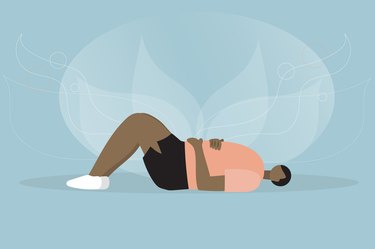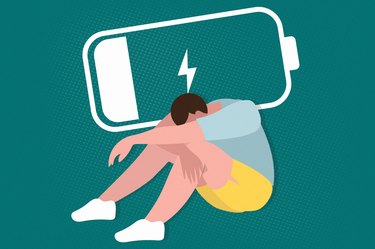
Although she has degrees in both psychology and kinesiology, as well as a certification in behavior change, Rae Wells, CSCS, a Future app performance coach, still has just as many tough motivation days as the enthusiasm-laden ones.
"Some days, it's easy for me to get up and hit the gym, but then there are the other days," she tells LIVESTRONG.com. "That might be due to general soreness or feeling overwhelmed with tasks, but sometimes it really is a mental health issue. It's important to know the difference."
Video of the Day
Video of the Day
Understanding what's normal for you is a first step, she says. But that's not always simple, because mental health struggles can sometimes mimic the symptoms of overtraining, says Joshua Norman, DO, a clinical assistant professor of psychiatry and behavioral health who specializes in sports psychiatry at The Ohio State University Wexner Medical Center.
For example, you might feel a wave of indifference, physical fatigue, irritability and low motivation. These are signs of overtraining, but they're also classic symptoms of depression. Or, you may feel restless, tired, have difficulty concentrating and feel like your heart is beating at a faster rate — again, potential effects of intense training sessions, but also telltale characteristics of anxiety.
Here are three key questions to ask yourself to figure out whether you just need a break from training — or if there's more going on.
1. How Severe Are Your Symptoms?
Feeling nervous right before a race or other competition is very common and some coaches encourage athletes to do some jumping at the start line to reset their nervous systems — or at least kill some time until the starting blare. But what if you're nervous all the time?
"Overtraining syndrome definitely causes symptoms, but they don't tend to be as strong or intense as you'd see with a mental health issue," Norman tells LIVESTRONG.com. "Also, new symptoms may start appearing, so these are layering on top of each other."
For instance, that nervousness leads to sleep disruption, which then prompts daytime sleepiness and difficulty focusing. One symptom's severity can create a ripple effect that begins to feel overwhelming, he says.
2. When You Take Time Off, Do You Feel Better or Worse?
If overtraining is suspected, the best strategy is to take time away from your chosen workout or sport, Norman suggests. That doesn't mean switching to a sedentary life instead — he says making the pivot to a different and more gentle type of activity is helpful.
For example, going on a leisurely bike ride or kayaking slowly rather than stacking up max-exertion training sessions. After about two weeks, Norman says mental effects from overtraining tend to lift.
"You begin to enjoy what you're doing more, you feel brighter and a sense of relief," he says. "Often, this is when people feel a new spark of motivation to get back to their sport and start to miss it in a way they hadn't before."
However, if symptoms continue to worsen despite the downshift in training, that's may be a sign it wasn't just the exercise creating the problem.
"Often, with a mental health challenge, it will become more difficult to handle as time goes on if it's unaddressed," Norman says.
Another major sign of this mood change is feeling disengaged with everything you're doing — not just fitness — says Ilan Danan, MD, sports neurologist at the Center for Sports Neurology and Pain Medicine at the Cedars Sinai Kerlan-Jobe Institute in Los Angeles.
"With both overtraining and mental health difficulties, feelings like joy, satisfaction and happiness are no longer there," he tells LIVESTRONG.com. "When you take a break from training, those tend to come back as you begin to feel refreshed. If they don't, there may be a deeper issue."
3. How Are You Sleeping?
Sleep can suffer when you overtrain, but similar to how your mood shifts with a break, your sleep should rebound as well, Norman says. Mental health challenges don't always cause sleep problems, but it's a prevalent problem — especially insomnia — according to the National Alliance on Mental Illness.
"Paying attention to sleep is incredibly important for sports recovery, but also for many other aspects of health as well," Norman says. "Keeping track of how you're sleeping, and whether that's getting worse or better, could give you critical info on your physical and mental health."
Next Steps to Take When Struggles Come Up
If you're experiencing deep feelings of sadness, anxiety or worthlessness, it's important to seek out professional help, Danan says.
This is particularly true if you've taken time off from working out or training for your sport and those feelings are intensifying instead of easing up. Ideally, he says, it's a good idea to check in with a mental health or sports professional — such as your coach if you're in an organized sport — early in the "taking a break" period so you can feel a sense of support.
For shorter and less intense mental health challenges where you're just having a tough day, Wells suggests having several strategies in place that you know have worked for you. For example, on those days, she opts for slower fitness sessions such as yoga or a long walk.
"When I'm having a tough mental health moment, my main focus is not letting it turn into a complete day," Wells says. "I do what my body wants in terms of emotional and cognitive capacity," including avoiding particular workouts she knows make her feel more stressed.
If there are several of these days in a row, Wells sees that as a sign she needs to cut back in other ways — not just exercise. She'll look at removing at least one or two items from her schedule and replace those errands, appointments or training sessions with an activity she knows bring her joy.
"With options like these, I've been successful at taking control of my mental health moments," she says.
We recognize the many obstacles in finding proper mental health care. Both access and affordability are huge issues. Low-cost options like Open Path Collective and Inclusive Therapists are available.
Was this article helpful?
150 Characters Max
0/150
Thank you for sharing!
Thank you for your feedback!





